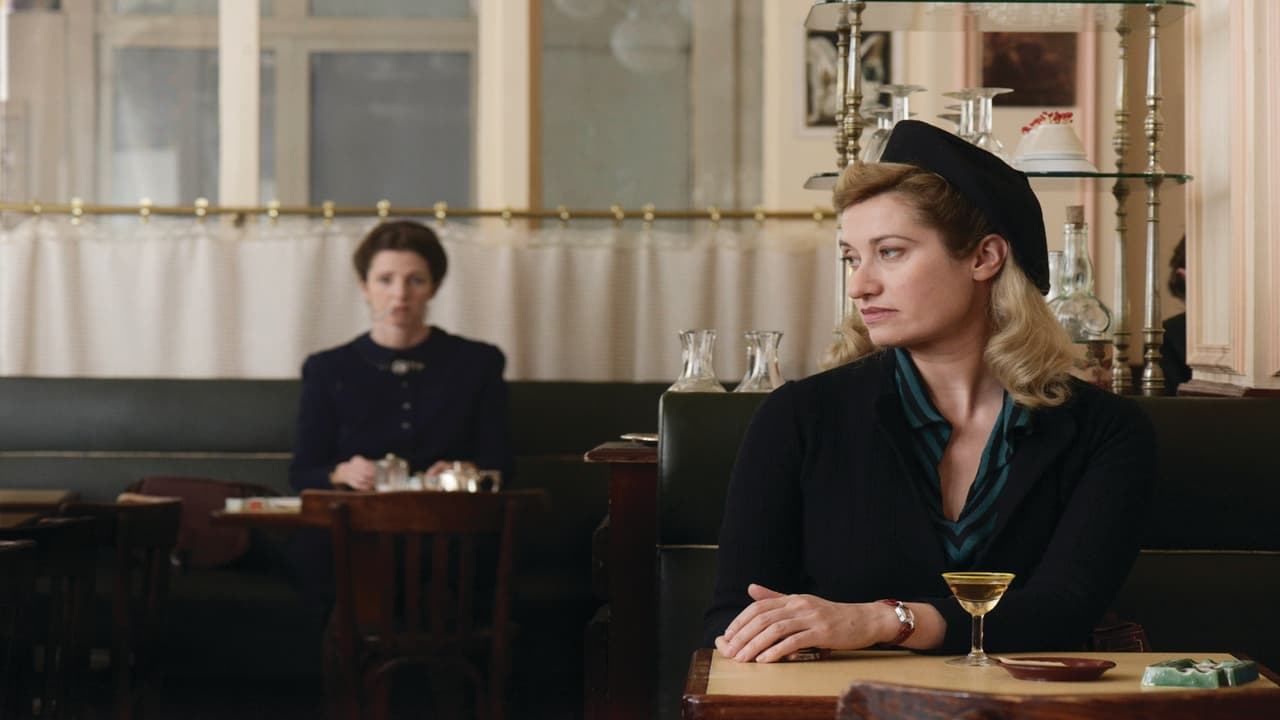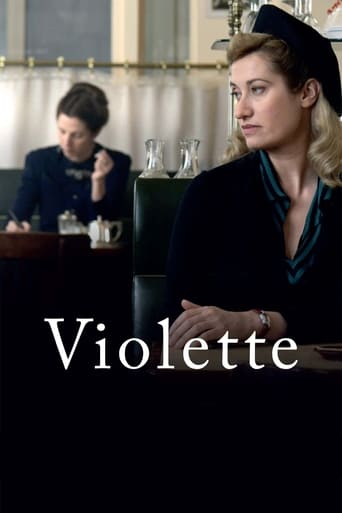

Brilliant and touching
... View MoreI am only giving this movie a 1 for the great cast, though I can't imagine what any of them were thinking. This movie was horrible
... View MoreI think this is a new genre that they're all sort of working their way through it and haven't got all the kinks worked out yet but it's a genre that works for me.
... View MoreGreat movie. Not sure what people expected but I found it highly entertaining.
... View MoreThe beginning is great: Violette is living with Maurice Sachs in a Normandy backwater in 1942. With the war on, life is precarious for the budding writer; she is forced to go on the black market to deal in the essentials of life. Sachs obliges her to sit down and write about her childhood and youth, as a way to bring in some extra cash. Soon Sachs is off to Germany as a labourer (he hoped to ingratiate himself with the Nazis by hiding his Jewish past). Sachs dies, and Violette is off to Paris as soon as she can manage it. Soon she meets Simone de Beauvoir, Jean Genet and Jacques Guerin (who becomes her first publisher). She starts to travel, something a girl from a poor family usually doesn't get to do. Finally she becomes a member of the Gallimard stable of writers; fame and some fortune are hers at last.Emmanuelle Devos impressed me very much with her tenacity in bad times and her masochistic devotion to Beauvoir. Sandrine Kiberlain, reed-thin and erect of bearing, looked and sounded very much like Beauvoir. Olivier Py as the sleazy Sachs stole all his scenes.
... View MoreMartin Provost's new film 'Violette' charts the professional life of French writer Violette Leduc (Emmanuelle Devos), who rose to fame in the middle of the 20th century.Leduc caught the attention of publisher Simone de Beauvoir (Sandrine Kiberlain), who published her story. But this was just the beginning of Leduc's long struggle for success, acceptance, and most of all friendship and companionship. She's not an easy person to like, constantly berating herself over her appearance, her writing, and questioning her motives for staying alive. Unwanted as a child, Leduc's insecurity and destructiveness is laid bare for all to see in a time when women had few rights. Her writing is raw, exploring subjects such as abortion and sexuality in ways previously unheard of in French society.Simone de Beauvoir keeps encouraging Leduc to right all her wrongs through writing, and their relationship is the anchor for this film. She introduces her to a distinguished group of intellectuals which include Camus, Sartre, Genet, and the rich benefactor Jacques Guerin (Olivier Gourmet). But regardless of her associations, Leduc eventually shuns them all. De Beauvoir is the only relationship Leduc has managed to sustain, but its ultimately a relationship of intimate rejections.Devos and Kiberlain excel as this most unlikely of pairings. As much as this film is about their relationship, ultimately it is about the torment in Leduc from repeated abuse and rejection. It was through her writing that Leduc finally understood life, where her preoccupation of the perception of others of herself eventually diminishing, replaced by her observations of them and channelled through her writing.
... View MoreFrench actor, screenwriter and director Martin Provost's fifth feature film which he co-wrote with screenwriters Marc Abdelnour and René de Ceccaty, is inspired by the life of a French 20th century author. It premiered in the Special Presentations section at the 38th Toronto International Film Festival in 2013, was shot on locations in France and is a France-Belgium co-production which was produced by producers Miléna Poylo and Gilles Sacuto. It tells the story about a daughter and sister named Violette Leduc who was born in the late 1900s in Arras in the commune of Pas-de-Calais in Northern France, at that time derogatorily called a bastard, who lived with her mother named Berthe and grandmother named Fidéline, met a man named Ernest Dehous in 1913 and who had begun her initial education at collége Valenciennes when the First World War started. Distinctly and subtly directed by French filmmaker Martin Provost, this quietly paced and fictionalized reconstruction of real events which is narrated mostly from the main character's point of view, draws a heartrendingly humane portrayal of a French citizen whom in the early 1940s during the Second World War in Normandie, France, met a Jewish Roman Catholic writer named Maurice Sachs, as a 33-three-year-old wrote for the first edition of the magazine Pour Elle and the daily newspaper Paris-Soir and who after the liberation of France was introduced to a French novelist and playwright named Jean Genet and a French perfumer and collector named Jacques Guérin. While notable for its versatile and atmospheric milieu depictions, reverent cinematography by cinematographer Yves Cape, production design by production designer Thierry François and costume design by costume designer Madeline Fontaine, this character-driven and narrative-driven story about significant people in the history of French culture and a memorable person who got her first novel called "In the Prison of her Skin" published in 1946, depicts an internal study of character. This densely historic, at times humorous and conversational reminiscence which is set in France in the 20th century and where a boarding school student and alumni at Lycée Racine in Paris, France who in the mid-1960s met a French author named Françoise d'Eubonne and whose life was marred by the ... of being born, starts an invaluable friendship with a French 20th century thinker who was writing a book and who encourages her to go on writing and use her personal experiences, is impelled and reinforced by its cogent narrative structure, substantial character development, subtle continuity, use of music, comment by Madame Simone Ernestine Lucie Marie Bertrand de Beauvoir: "The way you see yourself has changed." and the majestic acting performances by French actresses Emmanuelle Devos and Sandrine Kiberlain. A reflectively biographical, eloquently literary and lyrically cinematographic narrative feature.
... View MoreThe first thing that impresses is that this film is written very well. The structure is quite novelistic, separated into chapters and each part moving the story along in well paced increments. The whole movie starts quite slowly, mysteriously and then opens out, that is a pleasing form as it adds layers to the work.The second thing is that both Kiberlain and Devos are outstanding. Devos takes this role of Violette and makes it completely human. She is a dozen conflicted people and all the time in need of many things but most of all, in need of love. As de Beauvoir, Kiberlain is magisterial. She has de Beauvoir's haughtiness, her brilliance, her perfect sense of her own destiny.The relationship between the women of such different circumstances is told with grace and balance and insight.The photography and choice of locales is good too. The sense of place is considered, from the cold farm in winter, through to freezing Paris and then the Midi in summer at the end. Some shots may linger, because it can look so good on the screen, but that remark apart there is little to fault here.Recommended for all its best virtues.
... View More